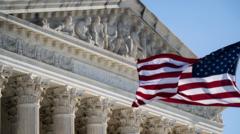Dellinger was dismissed via a concise email this month, which has led him to file a lawsuit against the Trump administration, asserting that his dismissal contravened federal protections that safeguard independent agency chiefs. These laws stipulate that a president can only remove such officials for just cause, specifically neglect of duty, malfeasance, or inefficiency.
After a federal judge in Washington D.C. granted Dellinger a temporary hold on his removal, the situation escalated when the D.C. Circuit Court of Appeals upheld this decision. Subsequently, the Justice Department filed an emergency appeal to the Supreme Court, now placing the question of presidential power front and center.
Sarah M. Harris, the acting solicitor general, articulated in the appeal that lower courts should not dictate employment decisions of the president, emphasizing the historical precedent where no court has previously mandated that a president retain an agency head against their will.
Amid ongoing legal challenges regarding various Trump administration policies—such as immigration and civil rights—this case signifies a pivotal moment in determining the limits of executive power. Furthermore, Trump's commitment to downsizing the federal workforce has seen thousands of employees terminated or incentivized to leave, affecting multiple federal agencies.
While this case plays out, workers previously employed by sectors such as Health and Human Services, Energy, and Veterans Affairs are feeling the immediate impacts of the government's efficiency measures. Under the guidance of a task force led by Elon Musk, the initiative reportedly seeks to streamline operations, even if it means significant staff reductions.
This unfolding legal saga calls into question the balance of power within the U.S. government and sets the stage for a potential precedent that may define the relationship between the presidency and independent agencies for years to come.
After a federal judge in Washington D.C. granted Dellinger a temporary hold on his removal, the situation escalated when the D.C. Circuit Court of Appeals upheld this decision. Subsequently, the Justice Department filed an emergency appeal to the Supreme Court, now placing the question of presidential power front and center.
Sarah M. Harris, the acting solicitor general, articulated in the appeal that lower courts should not dictate employment decisions of the president, emphasizing the historical precedent where no court has previously mandated that a president retain an agency head against their will.
Amid ongoing legal challenges regarding various Trump administration policies—such as immigration and civil rights—this case signifies a pivotal moment in determining the limits of executive power. Furthermore, Trump's commitment to downsizing the federal workforce has seen thousands of employees terminated or incentivized to leave, affecting multiple federal agencies.
While this case plays out, workers previously employed by sectors such as Health and Human Services, Energy, and Veterans Affairs are feeling the immediate impacts of the government's efficiency measures. Under the guidance of a task force led by Elon Musk, the initiative reportedly seeks to streamline operations, even if it means significant staff reductions.
This unfolding legal saga calls into question the balance of power within the U.S. government and sets the stage for a potential precedent that may define the relationship between the presidency and independent agencies for years to come.




















